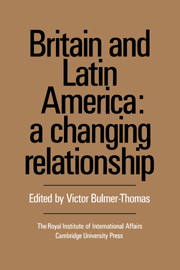Book contents
- Frontmatter
- Contents
- List of contributors
- Preface
- 1 Britain and Latin America in historical perspective
- Part I Cultural and political relations
- 2 Britain's cultural relations with Latin America
- 3 British policy towards Latin America
- 4 The United States factor in British relations with Latin America
- 5 Britain, Latin America and the European Community
- Part II Economic relations
- Part III Sources of friction
- Part IV Conclusions
- Index
5 - Britain, Latin America and the European Community
Published online by Cambridge University Press: 02 December 2009
- Frontmatter
- Contents
- List of contributors
- Preface
- 1 Britain and Latin America in historical perspective
- Part I Cultural and political relations
- 2 Britain's cultural relations with Latin America
- 3 British policy towards Latin America
- 4 The United States factor in British relations with Latin America
- 5 Britain, Latin America and the European Community
- Part II Economic relations
- Part III Sources of friction
- Part IV Conclusions
- Index
Summary
David Thomas (in the previous chapter) has discussed how Anglo-US relations affect British policy toward Latin America. This chapter is concerned with how British participation in the European Community (EC) affects our relations with Latin America. Both the strength of our ties with the United States and traditional British reserve about Europe have impeded close harmonisation of policy between London and Brussels. The still unresolved conflict between Britain and Argentina over the sovereignty of the Falkland/Malvinas Islands sharpens that divide. So the first question to consider is whether Britain has, or can have, an autonomous policy toward Latin America, separate from those of both the United States and Europe.
Certainly the British government has a policy of its own on the Antarctic; we have substantial post-colonial interests in the Caribbean and residual colonial commitments both there and in the South Atlantic; we have a policy on drug-trafficking, a standpoint on the Third World debt issue, a set of general policies on trade, investment and commodity markets, all of which impinge on Latin America without being specifically tailored to the concerns of that region. Britain also has a tremendous historical presence in the region. Between the early nineteenth and early twentieth centuries we were the most significant external power in South America and one of the major sources of both political and economic influence in Mexico, the Caribbean and Central America as well. Yet since the bond defaults of the early 1930s and the liquidation of most of the assets in the 1940s, our direct political and economic stake has gone into such an eclipse that we have difficulty nowadays even in recalling the nature of our former presence.
- Type
- Chapter
- Information
- Britain and Latin AmericaA Changing Relationship, pp. 83 - 100Publisher: Cambridge University PressPrint publication year: 1989



